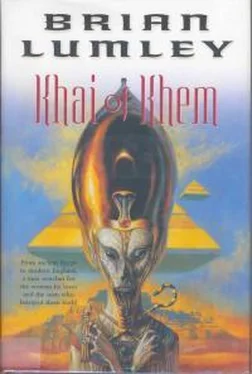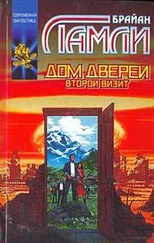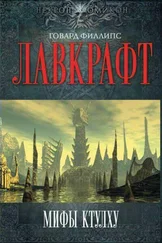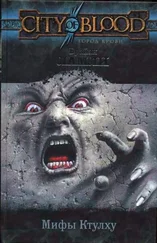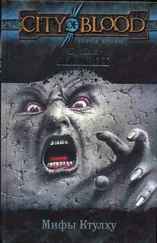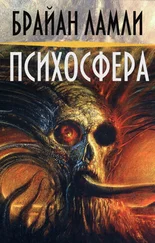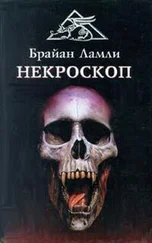“Harsin Ben,” the Pharaoh continued after a long moment of silence, during which his great carved head ponderously scanned the five, “Re has blessed me with an architect of matchless skill, and he has blessed you with a family of rare and radiant beauty. You have one son who is fine, strong and clever— who studies, I believe, the science of numbers and assists you in your structural calculations?—and another whose appearance I find strangely becoming. The boy is not an albino?”
“No, Descended from the Sky, his coloring is natural,” Harsin Ben answered.
“And yet unnatural to the point of beautiful,” Khasathut commented; and his great head angled toward Khai. “Come forward, boy.”
“Go to him,” Harsin Ben hoarsely whispered. “Go now—hurry!”
Trembling, Khai stepped quickly forward, prostrated himself and placed his forehead between Pharaoh’s feet.
“Up,” Pharaoh commanded, and Khai obeyed. He stood up and gazed wide-eyed at the great carven face before and above him. Shaded as he and the figure of the Pharaoh were by the as yet incomplete crest of the pyramid, the boy was able to look upon Pharaoh without being dazzled by the glittering face-mask and jewel-crusted body-structure. Behind the eyeholes cut in the facemask, he could now make out the moist glint of real eyes, wide and staring, which seemed to regard him with a hideous intentness.
“What do you do, boy?” asked the Pharaoh, and the boom and whoosh of his voice made Khai jump.
“I… I go to school, Omnipotent One.”
The great head nodded. “Of course you do. And what would you like to do?”
“I would be an archer in your army, Descended from the Sky,” Khai answered without hesitation, regaining something of his composure.
“Ah? Good! Then you shall practice at least one day in five. That will be arranged.” The great head lifted and looked beyond Khai. “Harsin Ben, come forward and bring your daughter.”
The old man and his daughter obeyed, began to prostrate themselves alongside Khai until Pharaoh stopped them. “No, do not get down,” he said. And now his huge head moved to gaze at Namisha.
Khai’s sister was dressed in a long, pure white chemise cut away to reveal her small, pert left breast; but with her hair in ropes, for all that she felt like a woman of the world, still she looked more like a girl of fourteen than a young woman of seventeen years.
“Harsin Ben,” came Pharaoh’s voice again, but lower this time and thoughtful. “This daughter of yours is lovely. In four more years, she should be given the chance to become a royal bride!”
Namisha gasped and staggered a little as if she were suddenly giddy, and her father could not stop his hand from flying to his mouth.
“Pharaoh—” he stumbled over his words, “Re on Earth—I don’t—I can’t—”
“Do not thank me,” Khasathut checked him. “Merely ensure that she comes to me unsullied. As for the boy: let him practice his archery and we will see. But in four years, then both of them come to me.”
“Namisha ... and the boy, Omnipotent One? But—”
“Yes, yes,” Pharaoh nodded, “the boy, too. There are duties for just such a boy in the pyramid. You have built my house and tomb, Harsin Ben, and is it not fitting that your son shall dwell therein with me? My Vizier, Anulep, has served me well for many years. Perhaps the time draws near when he should groom another for his work. …”
“Descended from the Sky,” Harsin Ben started again with a groan he could hardly suppress, “I—”
“You are overwhelmed, I know,” the great head nodded. “But I will hear no more of it. It is decided. You may go.”
IV
The Architect’s Apprentice
The pall of gloom which fell over the Ibizin household from that time onward was almost tangible in its intensity. While Khai could not quite understand it, he could nevertheless trace its source back directly to the day of the Pharaoh’s parade; and on several occasions when he came across his mother and father in the rooms of their house or in its grounds talking worriedly and in low tones, he would hear Khasathut’s name mentioned and know that indeed Pharaoh was the root cause of the mysterious misery.
Namisha, withdrawing into herself completely, became almost a ghost in a matter of months. This was partly of her own volition, her reaction to Khasathut’s awful interest in her, but in the main it was her poor father’s doing; for he dared not disobey Pharaoh’s commands, whose spies were everywhere and would certainly report any divergence from his instructions. That was why Harsin Ben had assigned one of his slaves to accompany Namisha wherever she went, and why she was no longer able to attend those parties she had so used to love. Now, with the fall of night, she must be safely home and under her father’s roof.
On those one or two occasions when Khai had asked what was amiss, he had been immediately and unjustly rebuked and sent away, and even Adhan would not explain to him what was wrong. When finally it got through to him that his own and his sister’s futures were the source of the distress, then he was even more confused. Surely his parents did not take seriously Pharaoh’s joke that he might one day make Khai his Vizier, his right-hand man? And was it not the greatest of all compliments for a girl to be chosen as a prospective bride for the God-king? In any case, four years seemed like such a long time to Khai and he couldn’t really see what all the fuss was about. Why, in four more years he would be nearly fifteen and almost a man! And surely he would then be able to choose for himself whether or not he should go to live in the pyramid.
Once, coming across his parents in the garden where they sat alone in muted conversation, he overheard what amounted to treason when his mother said that perhaps Pharaoh would not last four more years. Harsin Ben had compounded the crime by answering:
“Bah! Sick he may well be, wife, but his sickness is not of the body. Even if he were physically unwell, his physicians would keep him alive until I finish his pyramid, of that you can be certain. And if by some miracle he were to die—and how I have prayed for that—do you think they would let him stay dead? No, they would not! There are seven black and seven white mages in Khem and the lands around, and Pharaoh has called all of them that are black to him. He provides for them, and they for him. Even life, of a sort, they would provide if he were to die.”
“Husband,” she had answered in a frightened, gasping voice, “surely these stories we hear are only old wives’ tales? Lies that Khasathut’s enemies—”
“Do not deceive yourself, Merayet!” Harsin Ben had cut her short, his tone unaccustomedly sharp. “I know of a man who has seen men and women dancing in the pyramid’s lower chambers. And their faces were black with death and their bodies full of worms, for they had been dead for months! The Pharaoh keeps Theraens in his house who mix black magic and the embalmer’s art in proportions which produce total abomination. And that is not to mention his Dark Heptad of necromancers. … There is a room,” he lowered his voice to a shaky whisper, “where the viscera of mummies still live and move in tubs of fluids, as if they were never removed from their dead owners’ bodies!”
“Harsin Ben, how can you say these things to me?” Merayet had cried out. “How can you when you know that Namisha and Khai—”
“Hush!” her husband had quietened her, detecting an agitated rustling of leaves. “Khai?—is that you, boy? Come out of there!” And Khai had emerged from the shrubbery to be given a thorough telling off—which did nothing at all to quell his curiosity.
Читать дальше
